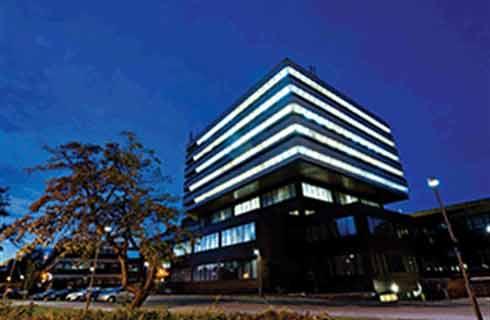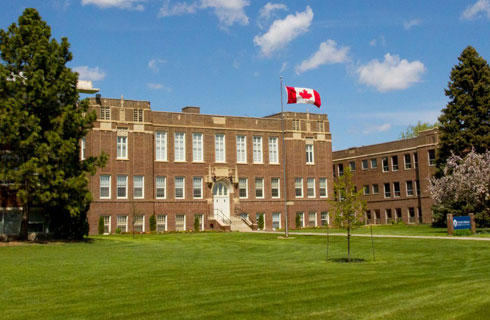- IDP China>
- 课程库>
- 自然科学>
- 生物与生物医学科学>
- 生物医学科学>
- Doctor of Philosophy in Biomedical Sciences - Molecular Genetics and Cell Biology
生物医学科学哲学博士-分子遗传学和细胞生物学
Doctor of Philosophy in Biomedical Sciences - Molecular Genetics and Cell Biology

学历文凭
Ph.D.

专业院系
Department of Biochemistry and Molecular Biology

开学时间

课程时长

课程学费

国际学生入学条件
IDP—雅思考试联合主办方

雅思考试总分
7.0
- 雅思总分:7
- 托福网考总分:100
- 托福笔试总分:600
- 其他语言考试:minimum score of 57 on the Pearson Test of English (PTE).
CRICOS代码:
申请截止日期: 请与IDP联系 以获取详细信息。
课程简介
This interdisciplinary program leads to the Doctor of Philosophy degree in biomedical sciences. It recognizes the interrelatedness of the various traditional disciplines and seeks to educate scientists who are qualified to develop this potential. Classroom and laboratory instruction stresses experiences that span a broad spectrum of knowledge. The program provides an integrated background in biological, physical, chemical, and computational disciplines in addition to in-depth training in a specific area of biomedical research. Graduates are expected to be sufficiently flexible to participate in solving a broad range of complex biomedical problems. The primary aim of the program is to prepare students for a research career. In-depth study is possible in a number of areas.<br><br>Opportunities for research training in the Molecular Genetics and Cell Biology Area of Concentration extend across the molecular, cellular, intercellular, and organismal levels of biology. During the course of study, students in this area can choose to become part of a wide range of laboratory projects, including investigations into the mechanisms of inherited disease, infection and immunity, signal transduction, and evolution. The spectrum of experimental approaches includes in vitro systems, bacterial, fungal, animal, and human cell culture, whole animal models, and population studies. Students in this area have the chance to experience research first hand, using the most modern tools and techniques in molecular and cell biology from experts in these fields. Among the many techniques applied to these experimental systems are DNA cloning and sequencing, genetic manipulation of bacterial, insect, and animal cells and their viruses, protein mutagenesis and expression, high resolution light and fluorescence microscopy, flow cytometry, mass spectroscopy, bioinformatics, and proteomics. Whether it is in the characterization of a novel signaling protein controlling tumorigenesis, or the discovery of new pathways regulating apoptotic cell death, the hallmark of the BMS Program study is an emphasis on interpersonal learning, exemplified by close studentfaculty interactions and peer exchange. Laboratory studies are supplemented by informal and formal seminars, journal clubs, laboratory meetings, travel to national meetings and student-mentor discussions. Students with a degree concentration in Molecular Genetics and Cell Biology are equipped for careers in academia, clinical research and testing, or industry in areas including molecular biology, cell biology, immunology, pharmacology, and ecology.
相关申请
 预科
预科 奖学金
奖学金 实习机会
实习机会 在校学习
在校学习 跨境学习
跨境学习 校园授课-线上开始
校园授课-线上开始 在线/远程学习
在线/远程学习
开学时间&学费
学费信息仅供参考,请与IDP联系以获取详细信息
| 开学时间 | 时长 | 学费 | 地点 |
|---|
关于莱特州立大学

莱特州立大学为那些希望在世界舞台上闪耀光芒、志向远大的学生开设有独一无二的课程。无论学生想成为科学家、艺术家、工程师、医生还是商业领袖,都能在该校找到适合自己的优质课程。 莱特州立大学以发明动力飞行的两位航空先驱莱特兄弟的名字命名。他们凭借勇气和决心改变了世界。现在轮到下一代了。学生可以通过 315 个本科、研究生、专业或博士学位课程获得成功所需的知识和工具。 目前,来自57个国家的1.2万多名学生在莱特州立大学学习和生活。位于代顿市中心附近的代顿校区和位于俄亥俄州赛利纳的莱克校区为学生提供了安全温馨的超棒的社区。代顿是美国最宜居的城市之一,生活成本低,收入水平高,为毕业生提供有很多机会。 莱特州立大学世界一流的教授和知识渊博的教职人员在学生求学之旅的每一步都为其提供支持。学生能够找到帮助自己实现梦想的人员和资源。从专业的学术和学生支持服务,到就业帮助,各项服务应有尽有. 学生可充分利用大学时光,尽可能多地取得收获。获得受到评鉴机构认可的优质教育,同时好好利用校园生活中的众多机会,加入社团、观看体育赛事或参加戏剧表演。在莱特州立大学有很多事情可做。周边社区也有很多活动可以参加,其中包括独木舟运动、滑冰以及文化活动和节庆活动等等。
本校相关课程

Master of Arts in English - Teaching English to Speakers of Other Languages
学历文凭
Masters Degree
开学日期
课程费用总额


公共管理硕士
学历文凭
Masters Degree
开学日期
课程费用总额


Master of Science in Human Factors and Industrial/Organizational Psychology
学历文凭
Masters Degree
开学日期
课程费用总额


Master of Science in Physiology and Neuroscience
学历文凭
Masters Degree
开学日期
课程费用总额


Master of Science in Teaching - Physics
学历文凭
Masters Degree
开学日期
课程费用总额


Master of Science in Physics
学历文凭
Masters Degree
开学日期
课程费用总额

其他相关课程

生物医学科学博士
 圭尔夫大学
圭尔夫大学学历文凭
Ph.D.
开学日期
课程费用总额


生物医学硕士
 圭尔夫大学
圭尔夫大学学历文凭
Masters Degree
开学日期
课程费用总额


健康科学(荣誉)学士学位-生物医学
 卡尔顿大学
卡尔顿大学泰晤士高等教育世界大学排名:511
学历文凭
Bachelor Degree with Honours
开学日期
课程费用总额


生物伦理法硕士(论文)
 麦吉尔大学继续教育学院
麦吉尔大学继续教育学院学历文凭
Masters Degree
开学日期
课程费用总额


健康科学学士-生物医学
 卡尔加里大学
卡尔加里大学学历文凭
Bachelor Degree
开学日期
课程费用总额


生物医学发现与商业化理学硕士[基于课程]
 麦克马斯特大学
麦克马斯特大学学历文凭
Masters Degree
开学日期
课程费用总额









 美国
美国